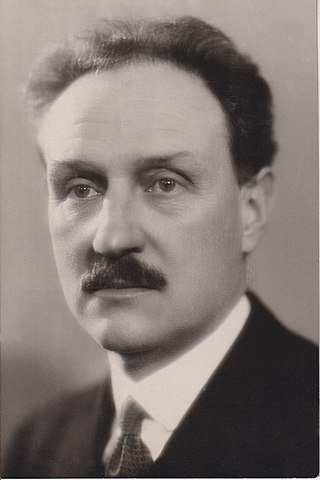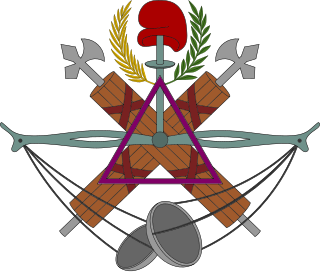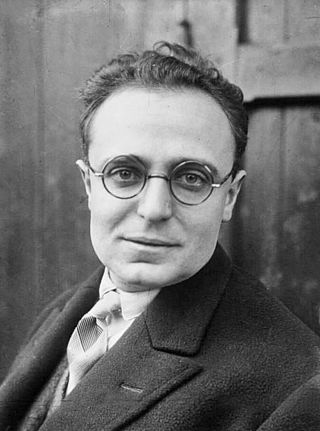
The political history of France covers the history of political movements and systems of government in the nation of France,from the earliest stages of the history of France until the present day. This political history might be considered to start with the formation of the Kingdom of France,and continue until the present day.

The Radical Party,officially the Republican,Radical and Radical-Socialist Party,is a liberal and social-liberal political party in France. Since 1971,to prevent confusion with the Radical Party of the Left (PRG),it has also been referred to as Parti radical valoisien,after its headquarters on the rue de Valois. The party's name has been variously abbreviated to PRRRS,Rad,PR and PRV. Founded in 1901,the PR is the oldest active political party in France.

Camille Chautemps was a French Radical politician of the Third Republic,three times President of the Council of Ministers.
The Popular Front was an alliance of left-wing movements in France,including the French Communist Party (PCF),the socialist SFIO and the Radical-Socialist Republican Party,during the interwar period. Three months after the victory of the Spanish Popular Front,the Popular Front won the May 1936 legislative election,leading to the formation of a government first headed by SFIO leader Léon Blum and composed of republican and SFIO ministers.

Liberalism and radicalism have played a role in the political history of France. The main line of conflict in France in the long nineteenth century was between monarchists and republicans. The Orléanists,who favoured constitutional monarchy and economic liberalism,were opposed to the Republican Radicals.

Manisa,historically known as Magnesia,is a city in Turkey's Aegean Region and the administrative seat of Manisa Province,lying approximately 40 km northeast of the major city of İzmir. The city forms the urban part of the districts Şehzadeler and Yunusemre,with a population of 385,452 in 2022.

Radicalism was a political movement representing the leftward flank of liberalism between the late 18th and early 20th century. Certain aspects of the movement were precursors to modern-day movements such as social liberalism,social democracy,civil libertarianism,and modern progressivism. This ideology is commonly referred to as "radicalism" but is sometimes referred to as radical liberalism,or classical radicalism,to distinguish it from radical politics. Its earliest beginnings are to be found during the English Civil War with the Levellers and later the Radical Whigs.

The 6 February 1934 crisis was an anti-parliamentarist street demonstration in Paris,organized by multiple far-right leagues that culminated in a riot on the Place de la Concorde,near the building used for the French National Assembly. The police shot and killed 17 people,nine of whom were far-right protesters. It was one of the major political crises during the Third Republic (1870–1940). Leftist Frenchmen claimed it was an attempt to organize a fascist coup d'état. According to historian Joel Colton,"The consensus among scholars is that there was no concerted or unified design to seize power and that the leagues lacked the coherence,unity,or leadership to accomplish such an end."

Sinistrisme is a neologism invented by political scientist Albert Thibaudet in Les idées politiques de la France (1932) to explain the evolution and recombination of party systems,particularly in France,without substantial changes occurring to party ideology.

The Radical Republican Party,sometimes shortened to the Radical Party,was a Spanish Radical party in existence between 1908 and 1936. Beginning as a splinter from earlier Radical parties,it initially played a minor role in Spanish parliamentary life,before it came to prominence as one of the leading political forces of the Spanish Republic.

Pierre Jules Cot,was a French politician and leading figure in the Popular Front government of the 1930s.
The far-right tradition in France finds its origins in the Third Republic with Boulangism and the Dreyfus affair. In the 1880s,General Georges Boulanger,called "General Revenge",championed demands for military revenge against Imperial Germany as retribution for the defeat and fall of the Second French Empire during the Franco-Prussian War (1870–71). This stance,known as revanchism,began to exert a strong influence on French nationalism. Soon thereafter,the Dreyfus affair provided one of the political division lines of France. French nationalism,which had been largely associated with left-wing and Republican ideologies before the Dreyfus affair,turned after that into a main trait of the right-wing and,moreover,of the far right. A new right emerged,and nationalism was reappropriated by the far-right who turned it into a form of ethnic nationalism,blended with anti-Semitism,xenophobia,anti-Protestantism and anti-Masonry. The Action française (AF),first founded as a journal and later a political organization,was the matrix of a new type of counter-revolutionary right-wing,which continues to exist today. During the interwar period,the Action française and its youth militia,the Camelots du Roi,were very active. Far right leagues organized riots.
The Independent Radicals were a centrist or conservative-liberal political current during the French Third Republic. It was slightly to the right of the more famous Radical-Socialist Party,and shared much of its historical radicalism. The prominent political scientist AndréSiegfried described them as "Social [that is,economic] conservatives who did not want to break with the Left,and who therefore voted with the Right on [economic] interests,and with the Left on political issues".

The Socialist Republican Union was a political party in France founded in 1935 during the late Third Republic which united the right-wing of the French Section of the Workers' International with the left-wing of the Radical republican movement.
The Frontist Party,also known as the Common Front or Social Front,was a political party in France founded in 1936 by Gaston Bergery and Georges Izard. It was a founding member of the Popular Front.
The Social and Radical Left was a parliamentary group in the Chamber of Deputies of France during the French Third Republic founded in 1928 by Henry Franklin-Bouillon. The Social-Radicals or Social-Unionists were members of the right-wing of the Radical-Socialist Party who refused a new Cartel des Gauches and supported the conservative coalition led by Raymond Poincaré. Most later became members of the Independent Radicals (PRI) or even the centre-right Democratic Republican Alliance.

The Union of Democrats and Independents is a liberal political party in France and former electoral alliance founded on 18 September 2012 on the basis of the eponymous parliamentary group in the National Assembly.

The Socialist Party is a centre-left to left-wing political party in France. It holds social democratic and pro-European views. The PS was for decades the largest party of the "French Left" and used to be one of the two major political parties under the Fifth Republic,along with the Rally for the Republic in the late 20th century,and with the Union for a Popular Movement in the early 2000s. It is currently led by First Secretary Olivier Faure. The PS is a member of the Party of European Socialists,Progressive Alliance and Socialist International.

The French Left refers to communist,socialist,social democratic,democratic socialist,and anarchist political forces in France. The term originates from the National Assembly of 1789,where supporters of the revolution were seated on the left of the assembly. During the 1800s,left largely meant support for the Republic,whereas right largely meant support for the monarchy.

The Fire of Manisa refers to the burning of the city of Manisa,Turkey,which started on the night of Tuesday,5 September 1922 and continued until 8 September. The fire was started and organized by the retreating Hellenic Army during the Greco-Turkish War of 1919-1922,and as a result 90 percent of the buildings in the town were destroyed. The number of victims in the town and adjacent region was estimated to be several thousand by US Consul James Loder Park. Turkish sources say that 4,355 people died in the town of Manisa.














